How a night spent with birthing ewes helped me find transcendence in the dark.
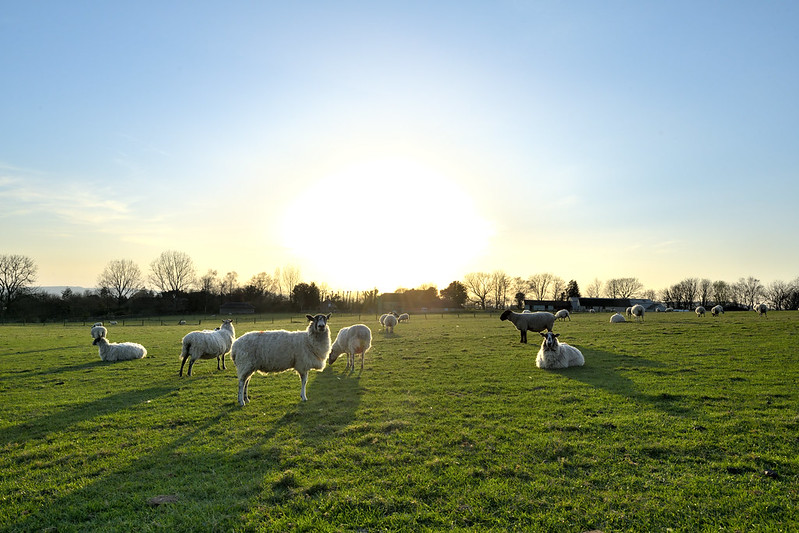
It’s midnight in the lambing field. In the darkness, we only see shapes; we notice the wind on our skin; slight noises assume importance. In the dark, our senses are heightened. In the dark, we are absorbed by the world around us. This world is two-dimensional, uncluttered by the nuance of color and depth. This is a world we are new to, but a world we have completely fallen in love with.
N, my partner, and I are helping a friend with lambing. We live on the edge of a city and have little knowledge of farm life. But he needed help, and we thought it might be fun. We packed up our campervan, drove to his farm and parked in the lambing field.
We are briefed, and then we’re off. I ride my friend’s bike and search the fields for signs of ewes in labor. When I find one, I call N. He arrives with a quad and trailer, and we take the newborn and mum back to the barn for post-birth care. N has been briefed to help with tricky births. I’m not sure I can, or to be truthful, want to. It’s messy, and I’m a two-shower-a-day, compulsive hand washer.
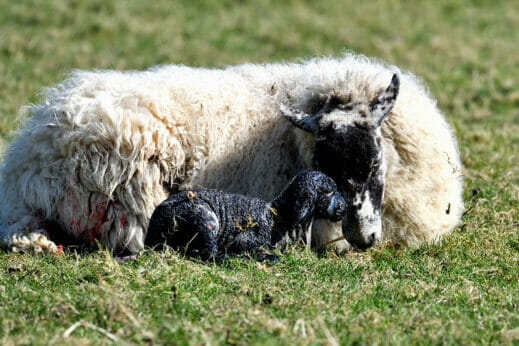
Photo by Frances Valdes.
After a couple of days, the inevitable happens. I’m forced to deal with a problem. I come across a dead or dying lamb, I don’t know which. I don’t want to know. I don’t want to feel responsible for not saving it. N and our friend are elsewhere, so I need to help. I try my best. I tickle the lamb’s nose with straw. I try to push on its chest as if doing CPR. As a last resort, I pick it up and hold it upside down, trying to drain its nostrils. I feel impotent. Nothing’s working. I thought I saw it breathe, but I don’t know. Am I doing what I should; am I doing it right?
As I bend over the lamb, its mother puts her face to mine. We look at each other, eye to eye. Our faces are close, and I think I feel her anguish. I think I see her willing me to help. I feel a connection deep inside. Of course, it’s my imagination. Of course, she is an animal. Of course, what I feel is my own projection—isn’t it?
I fail her. By the time N arrives, there is no doubt the lamb is dead. The ewe starts to give birth to a second lamb. I feel guilty, although we have been assured that sometimes you can do nothing. This is a very binary world: Some lambs live and some die.
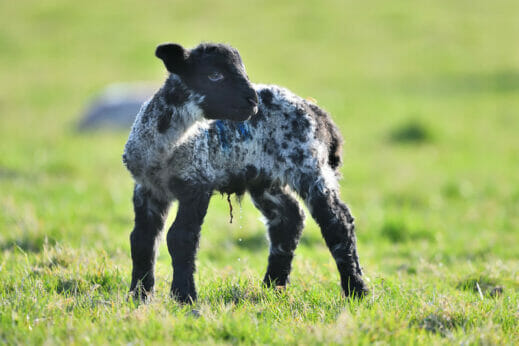
Photo by Frances Valdes.
Most days, neighbors arrive to help move ewes and lambs into a different field. They, like us, never miss a chance to pick up a lamb, ostensibly to bring it into the field—but who can resist a cuddle? As evening approaches, we round up the pregnant ewes and move them into the same field. The neighbors go home. We are by ourselves. The field is ours. Darkness descends, bringing with it stillness and quiet. We are bursting with happiness at being alone in the starlight field. It is the night that becomes etched onto our psyche. It is the night that makes us want to return next year. It is the night that is so different from anything else we have experienced.
The countryside is changed by the sun’s absence. Our charges now rely on us to keep them safe. A ewe feels protected giving birth under a tree or bush, so hedgerows become markers. Shapes, unnoticed during the day, take on significance. Is that movement at the edge of the field a fox? Is that the wind causing a rustle in the bushes? Was that the call of an owl?
We listen for whispers in the wind to reveal secrets: the first tiny bleats of a newborn somewhere in the darkness, cries unheard in the cacophony of the day. We must find new life before the fox does. The night air is filled with first breaths and the danger of last ones. Nature enacts dramas not seen in a world of artificial light.
We drive the quad bike and trailer to where we think the bleats originated. At night, navigation is done using ears, not eyes. The noise of the engine and the rattle of the trailer are anathema to the natural melodies of the night. But the sheep are used to it.
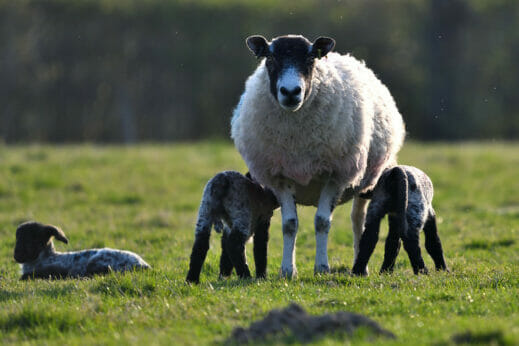
Photo by Frances Valdes.
Our headlamps scan the field for the newborn. All around, pregnant ewes are sleeping or eating. They look up as we pass, the light catching iridescence in their eyes, giving them a spectral appearance in the dark. The light obliterates the night sky, stars are blinded, the moon becomes a disc hanging above the trees.
We see two glittering eyes close to the ground: a newborn lamb. The ewe is lying next to it. Her head is thrown back as she gives birth to a sibling. She is noiseless. We wait and watch. Beneath our feet, early evening dew is coalescing into ice crystals. We smell the cold air signaling a developing frost. The clear sky is blacker than any seen in towns, the moon brighter than we usually see, the stars more plentiful than in our back garden.
The world of the lambing field at night hypnotizes us. We feel subsumed into nature. We do not think of the past or what to do tomorrow. We just watch the ewe, the newborn and look at the sky. Waiting is part of the magic. We are connected with shepherds around the world and throughout the centuries. The parable of the Lost Sheep has new meaning. I think of the number of Christmases I have sung about shepherds “minding their flocks at night”. We try to name the constellations. I think of ancient shepherds who did the same.
The twin is born. We wait a short while for the mother to clean her offspring. But we need to interfere with nature; to ensure survival. I use the shepherd’s crook as I’ve been taught. It hooks under the little lamb’s back legs, and I drag it across the damp grass towards the nearby trailer. I do the same for its sibling. The crook seemed cruel when I was first shown how to use it. Now, I realize that it is the most efficient way to get the lambs. The lamb is still wet with after-birth; they are not easy to handle. In the beginning, this repulsed me; but now, it is just part of life.
The tiny lambs, less than ten minutes old, are now in the trailer and crying pitifully. It is hard not to anthropomorphize what I hear. They sound like human babies. We stand back and wait. We see the ewe’s distrust, her fear that we are taking her lambs. She runs around the trailer. She is desperate for her newborns, but also frightened of being trapped in the trailer.
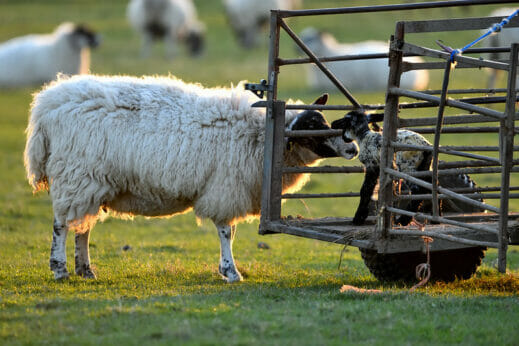
Photo by Frances Valdes.
Finally, the ewe puts her front legs in the trailer. We wait a brief moment for her to feel more confident and then N pounces. He catches the ewe off-guard and pushes her into the trailer. Until this week, I had not realized how strong sheep were. Earlier, I caught a new mother and gripped her between my legs. I called N for help. By the time he looked up, I was face down on the ground, my glasses beside me. Just a little shake and she had freed herself.
I shut the trailer gate and use the crook to place the lambs in a small penned area at the front of the trailer. This ensures they can’t be trodden on in the short journey to the barn. The barn is lit and full of other ewes and lambs. The ewes are treated to a bucket of pellets. The lambs lie down. They are tired and oh so cute. We leave the light of the barn and return to the magic of the lambing field.
Across two fields, a half mile in the distance, orange lights illuminate another world—the world of a supermarket car park on the edge of the town. A world of clutter, din and manmade smells. A world where nature is an intrusion on man’s control. A world where there are twenty different types of breakfast cereals, thirty different types of tea and coffee. In the lambing field, there are two choices: breathe or don’t.
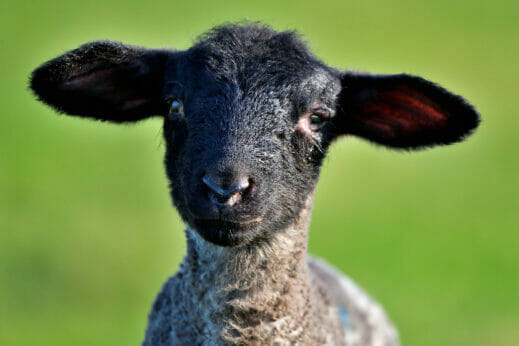
Photo by Frances Valdes.
Our friend relieves us at 2 a.m. We are tired but sorry our night has ended. Normally, we are asleep at this time. Normally, our world is artificially lit at night. Normally, we seldom see the winter sky.
After a week of nighttime lambing, we return home. But I wake at midnight longing to be back in the field, in my special place. I long for darkness to throw light on different senses. I long for silence to reveal strange sounds. I long for nature’s simplicity to display the fullness of life.
Frances Valdes lives in Brighton, UK, with her husband and three cats. She is fairly new to writing, having had previous careers as a solicitor, and running her partner’s software business. Apart from enjoying writing, she also loves photography.
What a beautifully written article. Mrs. Valdes might be new to writing, but she clearly has a gift for it.
Very well presented. Every quote was awesome and thanks for sharing the content. Keep sharing and keep motivating others.
Beautiful article.